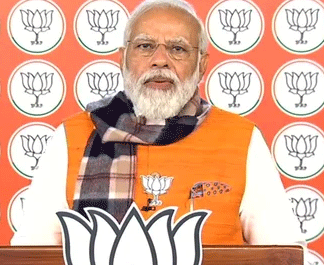A five-member bench of the Indian Supreme Court on Monday morning read out its verdict in a case challenging the government’s ability to abrogate the special law and bifurcate the territory.
The bench, led by Chief Justice DY Chandrachud, held 16 hearings over 35 days and had reserved its verdict in early September. Announcing the verdict on Monday, it gave a unanimous verdict with Justices Kishan Kaul and Sanjuv Khanna authoring additional but concurrent notes. A five-judge Constitution bench, presided by Chief Justice of India (CJI) DY Chandrachud, had reserved its verdict on as many as 23 petitions in the matter on September 5 this year, after 16 days of hearings. The bench also comprised Justices S K Kaul, Sanjeev Khanna, B R Gavai and Surya Kant.
In its verdict, the Supreme Court noted that Article 370 was always a temporary provision and that it was meant to provide for the constitutional integration of Jammu and Kashmir with India, and it was not for disintegration. Further, it ruled that the Indian President had the power to declare Article 370 to cease to exist.
The CJI said Article 370 is a temporary provision, based on a reading of the historical context in which it was included.
Prime Minister Narendra Modi termed the verdict “beacon of hope”, mentions “Naya Jammu Kashmir”
In a post on the social media platform X, Prime Minister Narendra Modi wrote, “The verdict is not just a legal judgment; it is a beacon of hope, a promise of a brighter future and a testament to our collective resolve to build a stronger, more united India. #NayaJammuKashmir”
The court further noted that all provisions of the Indian Constitution can be applied to Jammu and Kashmir.
The Supreme Court went on to direct the Indian Election Commission to conduct elections for the legislative assembly of Jammu and Kashmir by September 30, 2024, and ordered that its statehood should be restored as soon as possible.
The court also upheld New Delhi’s move to reorganise Ladakh as Indian territory.
The Supreme Court answered in favour of the government on three questions.
One, on the ‘unique’ and ‘special status’ of Jammu and Kashmir.
Two, is Article 370 a ‘temporary’ or a permanent provision of the Constitution?
Three, the questions relating to the effective abrogation of Article 370. Read
In his separate, concurrent judgement, Justice Kishan Kaul called for the creation of a truth and reconciliation body to “heal” the wounds carried by the people of Jammu and Kashmir.
He said that the people of the disputed territory suffered a lot, and wounds needed healing. The Truth and Reconciliation Commission was directed to probe human rights violations by state and non-state actors since the 1980s and find out what the people of Jammu and Kashmir had been through.
The Supreme Court in a 5-0 unanimous ruling upheld the Centre’s abrogation of Article 370 of the Constitution on Monday (December 11).
Chief Justice of India (CJI) D Y Chandrachud and Justice Sanjay Kishan Kaul wrote two separate but concurring opinions.
The SC held that J&K did not retain any element of sovereignty after its accession to India in 1947.
The court said that although Maharaja Hari Singh, the erstwhile ruler of the princely state, issued a proclamation that he would retain his sovereignty, his successor Karan Singh issued another proclamation that the Indian Constitution would prevail over all other laws in the state.
This in essence, had the effect of a merger like every other princely state that joined India, the court ruled.
The court emphatically concluded that Jammu and Kashmir has always been an integral part of India. CJI Chandrachud cited Section 3 of the J&K Constitution itself, apart from Article 1 and 370 of the Indian Constitution.
Article 3 of the J&K Constitution reads: “The State of Jammu and Kashmir is and shall be an integral part of the Union of India.” The state’s Constitution also provided that this provision cannot be amended.
Justice Kaul said that being the only state with its own Constitution also does not define a special status. “The purpose of J&K Constitution was to ensure everyday governance in the state and the purpose of Article 370 was to integrate the state with India,” he said.
The Supreme Court upheld both the presidential proclamations of August 2019.
Apart from the larger federal issues and the debate around the special status of J&K, the key legal challenge was to the two Presidential proclamations in 2019 which in effect abrogated Article 370.
The Court upheld both the proclamations, including the one that gave a new meaning to “constituent assembly of Jammu and Kashmir”, as “Legislative Assembly of Jammu and Kashmir.”
The central issue was whether these actions could be taken by the Union assuming powers of the state when it is under President’s rule. Here, the Supreme Court referred to the landmark 1994 ruling in ‘SR Bommai v Union of India’ which dealt with the powers and limitations of the Governor under President’s rule.
CJI DY Chandrachud said that the Governor (President in J&K’s case) can assume “all or any” roles of the state legislature and such action must be tested judicially only in extraordinary cases.
Relying on an interpretation of the Bommai ruling, the SC said that there is “no prima facie case that the President’s orders were malafide or extraneous exercise of power.”
The verdict was not warmly received in Jammu and Kashmir, where leaders expressed “disappointment” with it.
Democratic Progressive Azad Party President Ghulam Nabi Azad stated: “We are disappointed by the Supreme Court verdict.”
He added that two institutions could impact the region’s status; one is the Parliament, and the other is the Supreme Court. Since the Parliament had abrogated Article 370, our last hopes were with the Supreme Court; today, they have also been dashed.
Azad said that the people of Jammu and Kashmir waited nearly four months where it was deliberated with various views on it presented.
He said that all the people, whether from Jammu or Kashmir, are not happy with this decision.
He said that this decision would negatively impact the economy of the valley by raising prices of land while employment opportunities – which were primarily available only in the government sector – would also be impacted.
He stated that this was a very good bench, which has given its interpretation. Article 370 was hastily abolished on August 5, 2019; no one bothered to ask the people of Jammu and Kashmir, he said.
Later, he added that while the direction to hold elections and grant statehood were in their favour, removing other rights and protections which would impact their livelihoods were not in their favour.





